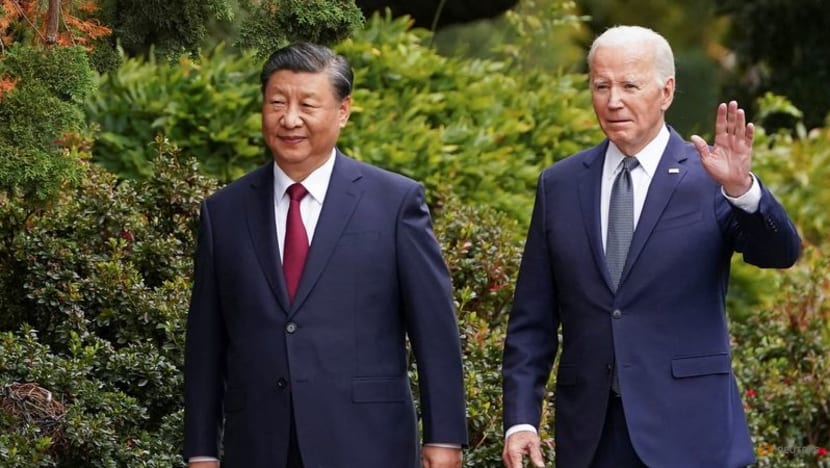CNA Explains: How crucial was the Xi Jinping-Joe Biden meet, and what does it mean for US-China ties?
Experts are "cautiously optimistic" about the significance of the two leaders finally coming face-to-face after a year - and what it also means for the rest of the world.

US President Joe Biden waves as he walks with Chinese President Xi Jinping at Filoli estate on the sidelines of the Asia-Pacific Economic Cooperation (APEC) summit, in Woodside, California on Nov 15, 2023. (Photo: Reuters/Kevin Lamarque)

This audio is generated by an AI tool.
SINGAPORE: A year and a day since China’s President Xi Jinping and his US counterpart Joe Biden last met in person, the leaders of the world’s two biggest economies sat down together again on Thursday (Nov 16).
Their four-hour discussion just outside of San Francisco, where the Asia-Pacific Economic Cooperation (APEC) forum is taking place, comes amid fraught but of late friendlier ties between Beijing and Washington - and as the world contends with economic gloom, wars in the Middle East and Europe, regional tensions and more.
Biden later hailed “real progress” made in “some of the most constructive and productive” talks he’s ever had with Xi, while Chinese state media cited experts saying “expectations of both sides are beginning to align”.
What key points were made?
Opening remarks by Biden and Xi were “promising”, Zhu Zhiqun, a professor of international relations and political science at Bucknell University in the US, told CNA.
Both leaders mentioned how they first met 12 years ago as vice-presidents, with Biden referring to their “many hours” spent together and Xi saying he still remembers their “interactions very vividly”. And both emphasised their responsibility to the world, with Xi adding that China and the US shoulder a “heavy” duty to human progress and history.
Over ensuing meetings, a working lunch and a garden stroll, the presidents then reached what Chinese state media called a “slew” of agreements on key issues, including:
- Resuming military communications which were severed after then-US House Speaker Nancy Pelosi visited Taiwan in August 2022
- Resuming high-level communications where “each one of us can pick up the phone call directly", said Biden
- Cooperating on drug control, with China agreeing to curb the production of the opioid fentanyl, a leading cause of overdoses in the US
- Having more dialogues on the risks and safety issues around artificial intelligence
Chinese state media also said commitments were made to “significantly” increase flights between the countries in early 2024, and to grow exchanges in “education, international students, youth, culture, sports, and business communities”.
Before heading to San Francisco, Biden said he’d consider his meeting with Xi a success if the two countries “get back on a normal course of corresponding”.
Zoe Liu, a fellow for China studies at the Council for Foreign Relations, told the Associated Press the agreements were “positive signs indicating both countries aim to put a floor to prevent the bilateral relationship from further deteriorating”.
She also said that while they would not change “structural challenges” in US-China ties, “it paves the way for more detailed working-level discussions, which is more important”.
What’s changed since their last meeting?
Thursday’s meeting was the culmination of extensive negotiations between Biden and Xi’s aides in an attempt to repair a relationship in freefall since former US President Donald Trump launched a trade war in 2018.
Tensions further escalated after Pelosi’s visit and the US downing of a suspected Chinese spy balloon in February, despite Biden and Xi coming together in Bali in between.
“Both sides became really concerned about the possibility of conflict,” said Prof Zhu, pointing to efforts to resume high-level dialogue in recent months.
The Biden administration has dispatched cabinet members including Secretary of State Antony Blinken and Secretary of Treasury Janet Yellen to China, with China reciprocating by sending Foreign Minister Wang Yi, climate change envoy Xie Zhenhua and Vice Premier He Lifeng to the US.
Both Biden and Xi are also grappling with domestic issues. The US President is gunning for reelection next year but trails Trump in polls, while dealing with a government divided over an array of issues including Washington’s involvement in the wars in Ukraine and Gaza.
China’s recovery from the pandemic on other hand has been hamstrung by a slowing economy, aging population, growing debt, rising unemployment rates and shrinking foreign investment to name a few.
"China needs some help, perhaps from the United States, to jumpstart its economy,” said Prof Zhu.
What next for China, US and the rest of the world?
Beijing’s main expectations for the talks was for more stability in US-China ties, and more concrete actions from Washington to improve relations, said Prof Zhu.
Zhang Yang, an assistant professor at American University’s School of International Service, told the AP that symbolically, Xi also wanted to signal to the Chinese people that Biden respects him and that he’s been handling their relationship well.
In a solo news conference after their meeting, Biden said he stood by his view that Xi was a dictator “in the sense” of the Chinese President running a communist country “based on a form of government different” than the US’.
A similar reference in June sparked fury from Beijing, though there was no immediate reaction from the Chinese delegation in San Francisco.
“The overall relationship is still very difficult and tense due to structural problems and lack of mutual trust,” said Prof Zhu. But he was “cautiously optimistic” that things would slightly improve after the summit.
“There are many areas that both sides can work together on, despite the differences,” he added, calling for pragmatism and a focus on common interests in the likes of climate change, nuclear non-proliferation, trade and global health.
On Thursday however Xi and Biden remained far apart on the long-running flashpoint of Taiwan, with their rhetoric unmoving from recent spats.
US officials said the two leaders had a substantial but “clear-headed” back and forth over the island which China claims sovereignty over.
Biden reportedly asked Xi to “respect” elections in Taiwan next year, while Xi said China had no plans to invade in coming years. He also told Biden that peaceful reunification was “unstoppable”.
"Look, peace is ... all well and good but at some point we need to move towards resolution more generally," said Xi, according to US officials.
Prof Zhu said both sides would be careful not to come across as interfering in Taiwan's 2024 polls.
“They will have to wait until the election outcome is out, and see who will be the winner, and then perhaps they will decide whether they will adjust policy towards Taiwan,” he said.
Asked how Southeast Asia should view the meeting given the ongoing US-China tussle for influence in the Indo-Pacific, Prof Zhu said countries in the region should be relieved and encouraged “by the very fact that the two leaders are talking to each other”.
“For a long time, many countries in Southeast Asia including Singapore often found themselves between a rock and a hard place,” he said. “They feel pressure from both Washington and Beijing, to take sides in the great power rivalry. And nobody wants to make that kind of a painful choice.”
With both sides now appearing to play down chances of a confrontation or a new Cold War, Southeast Asian states can “conduct their own foreign policy” going forward.
“They can and should maintain productive relations with both powers,” Prof Zhu noted. “Southeast Asian countries should look at this conference very positively.”
















